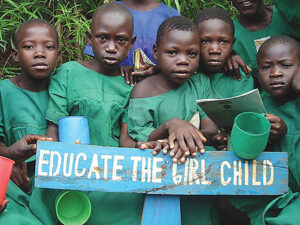By Ebi Kesiena
Every year in the month of October, the world unites to observe the International Day of the Girl Child. This significant day is set aside to shed light on the challenges faced by girls across the globe while advocating for their rights and overall well-being.
The future of girls in Africa holds immense promise and profound challenges. As the continent undergoes rapid social and economic transformations, the role and well-being of young girls remain central to shaping Africa’s growth and development.
Yet, in many regions, girls continue to face barriers to education, healthcare, and equal opportunities, limiting their potential and societal contributions.
Child Marriage In Africa
The reason for child marriage varies from place to place on the African continent. Although, these reasons are not justified, it shows the multi-cultured nature of the African society.
Child marriage is as old as most African marriage tradition culture. Today, it has become a cause for concern, raising several questions on its impact on the female child. In most parts of Africa especially West and Central, a female child can be betrothed to a suitor at birth and at puberty, she is then mandated to leave for her husband’s house.

It is a common practice for parents to give out their under-aged daughter to a wealthy man in exchange of monetary gains. Another common scenario is when a female child is given out in marriage to pay back debts owed by parents.
In 2023, a non-government organization based in Nigeria, raised a case of child marriage. The marriage was between a four year old girl and a 54-year old man in the Niger Delta Region region of Nigeria. The NGO described the union as illegal and criminal, arguing that it is totally unacceptable for a minor to be given out for marriage under any circumstance.
In a statement released by the NGO, it was confirmed that the marriage was consummated at the instance of the girl’s parents who claimed that the 54-year old man was her husband in their previous life.
Community sources revealed that if the marriage rite is not observed as agreed, the man will not be able to marry and achieve any success in life, while she will die. Such stories are profound in many African societies thereby giving legitimacy to the practice.
Whatever the causes of child marriage, from poverty, myth or cultural norms, the consequences are felt negatively. Due to early marital duties, the girl child loses her childhood, is exposed to sexual abuse such as rape, resulting in early reproductive health complications during and after child birth.
Among others, these child brides are denied education both formal and informal. They become dependent on their spouse. It is generally observed that the consequence of child marriage comes with pain, regrets and disappointment for these girls.
Strengthening Laws and Policies
According to Africa Health Organization, 15 million girls are forced to marry each year – that is 28 girls in a minute. It further reports that 250 million women alive today were married at the age 15 against their will.
UNICEF agrees with Africa Health Organization’s statistics on the prevalence of child marriage in Africa. UNICEF’s statistics shows that six of the world’s 10 countries with the highest rates of child marriage are in West and Central Africa. The statistic shows that average prevalence across the region is high and above 41% of girls marries before reaching the age of 18.
Human Rights Watch published on their site – hrw.org that a staggering 40% of girls marry before age 18, adding that African countries account for 15 of the 20 countries with the highest rates of child marriage. It warns that without progress to prevent child marriage, the number of girls married as children will double by 2050 and Africa will surpass South Asia as the region with the highest number of child brides in the world.
To some, this is a falacy but Mama Ivie confirms these statistics. Mama Ivie blames her economic woos on the farm produce that cannot meet her daily needs. She often tells her three daughters when they gather to peel cassava from the farm to produce garri or fufu, how her parents gave her out to marry their father at age 16.
Today, she is 40, looking old and worn out like a 70-year old woman. Mama Ivie’s health deteriorates as the days surge on. She had five children early in marriage with year spacing, but however lost all of first four children to the cold hands of death.
She has sent her surviving daughters to school, as two are already graduates while the last one is in her third year. She struggled to give them education. Mama Ivie vowed not to allow her female children experience her kind of life.
With such experiences from Mama Ivie, and the many government laws and policies, it is expected that child marriage will be nipped as a thing of the past soon. But there are pocket of cases both reported and unreported.
The Child Right Law has made it compulsory for every child to get free and compulsory education in Nigeria, but it remains a sad unreality. It is compulsory that every child should be educated from primary to secondary level.
To mitigate the effect of child marriage, various regional governments in Africa should effectively implement these laws and policies. This will be a panacea to end child marriage as against the Human Right Watch prediction of ranking Africa with highest number of child marriages.
Call to Action

The theme of this year’s International Day of the Girl is ‘Girls’ vision for the future’.
This theme reflects findings from UNICEF analysis, which shows that girls are not only courageous in the face of challenges, but hopeful for the future. Every day, they are taking actions to realize a vision of a world in which all girls are protected, respected and empowered.
But girls cannot realize this vision alone, they need allies who listen to and respond to their needs, we need to secure the future of our girl child as we give girls a chance.




































